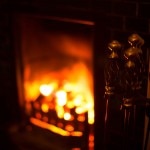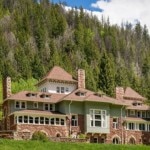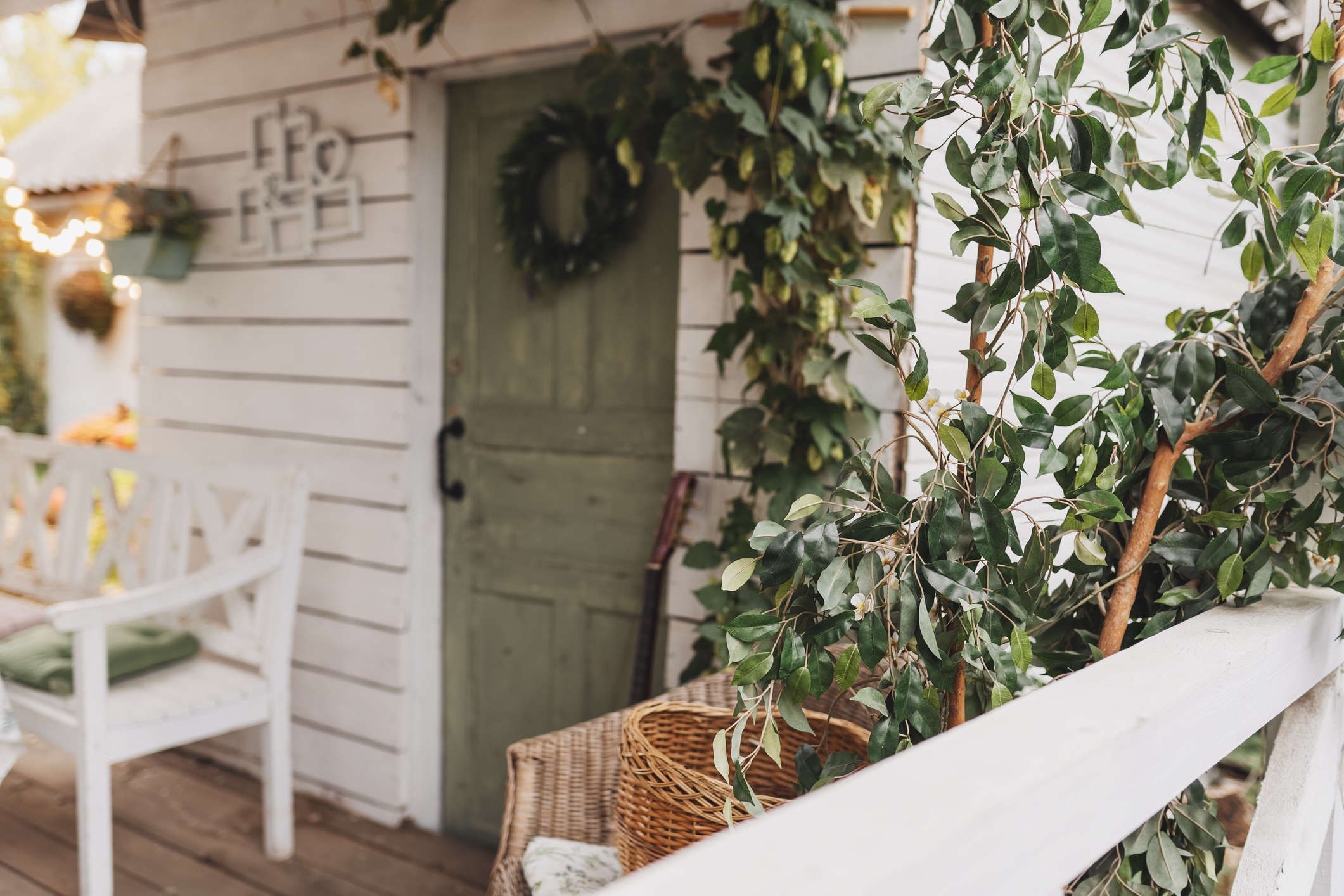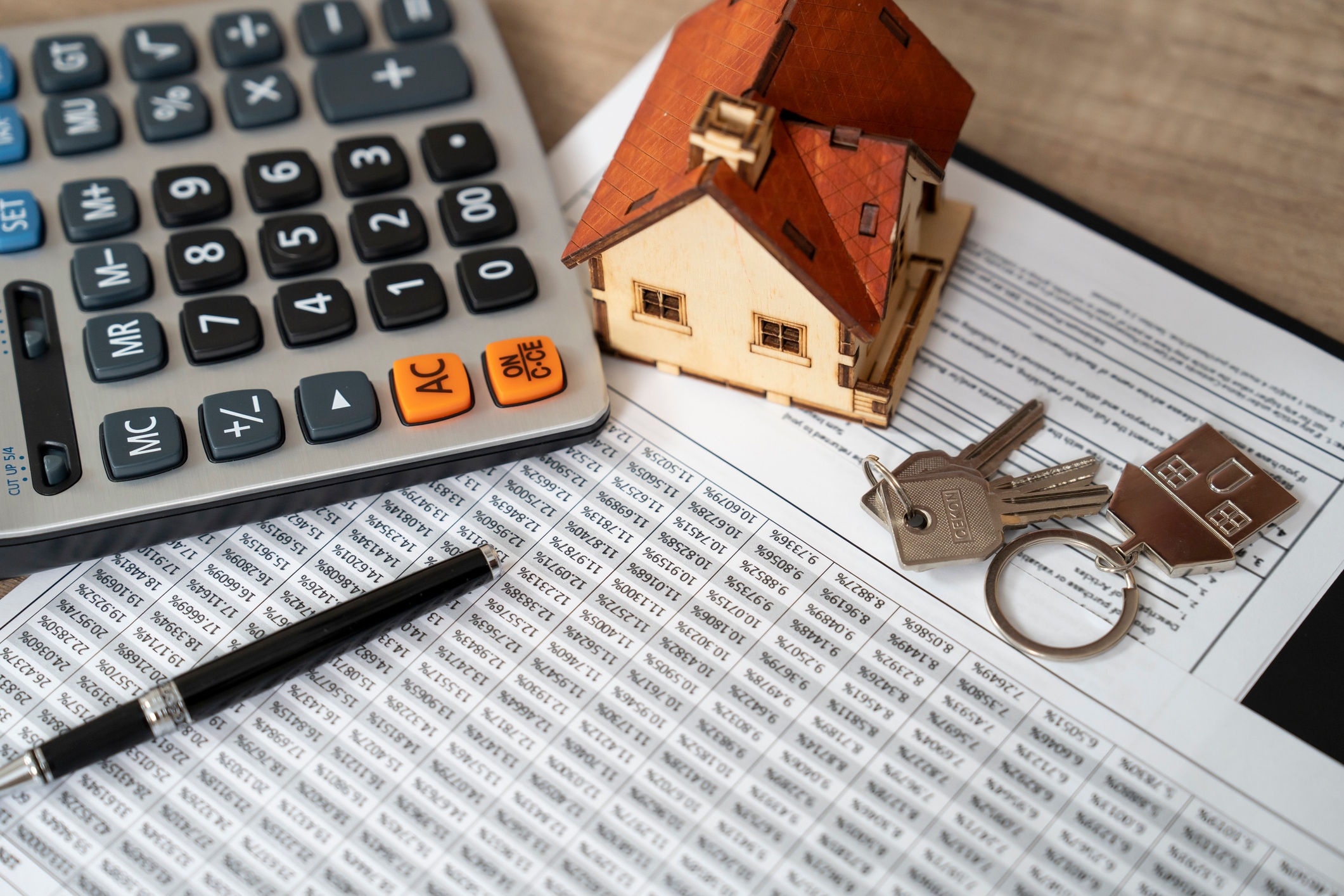Pressure washing or power washing is the use of spraying water under high pressure to remove loose paint, mold, algae, grime, dust, mud, chewing gum and dirt from surfaces and objects like buildings, fences, masonry, some vehicles and concrete or asphalt surfaces such as driveways or patios. The terms “power washing” and “pressure washing” are often used interchangeably, but the fact is they’re two different processes. Both use water under high pressure to clean surfaces, but power washing has a heating element to heat the water and pressure washing does not.
As with any cleaning process heated water cleans better. Some things should be power or pressure washed with added chemicals, like baking soda, vinegar, citric acid or commercial power washing soaps, detergents, sanitizers, or disinfectants. Here are seven other things you should know before power or pressure washing anything around your home:
One: Know when to power wash vs pressure wash
The idea of a good steam cleaning of your house, deck, driveway or other household features is appealing. Hot water shot through a high-pressure hose will take off just about the most stubborn dirt and stain. But, it’s not really the best choice for things like brick or concrete, or masonry. All that cleaning power comes with a price. Power washing can be very harsh on those surfaces. Use a pressure washer with an appropriate cleaner instead.
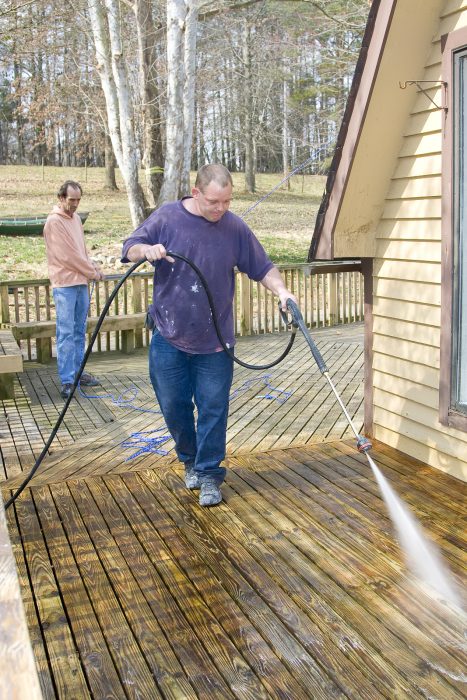
Power Washer – the Heavy-Duty Option
- Use for large areas like extra-long or big driveways
- Use where you have extreme dirt, grease, moss, weed buildup and slick surfaces due to mold. The heated water here can loosen up stuck-on grime outdoors just like hot water cleans dishes and floors better than cold. It also kills mold and moss and prevents their quick return.
- Use power washers on hard surfaces that can stand up to the heat and pressure
Pressure Washer – the Safer for Surfaces Option
- Use for small patio, deck, or driveway areas
- Use for softer surfaces, like wood decks, siding, and tiled areas
- Use on areas like masonry, concrete and brick
Two: Know the difference between residential and professional detergents, soaps, chemicals, and cleaning solutions
Not all cleaning solutions are the same. Understanding the difference among cleaners can mean the difference between cleaning and destroying what you are power/pressure washing. There are four types of chemicals used in power/pressure washers. These chemicals are labeled based on their intended purpose and the type of surface they are to be used on. Cleaners remove dirt, sanitizers kill most (99.999 % of bacteria in 30 seconds or less), and disinfectants kill all organisms within 30 minutes.
Every surface of whatever you’re cleaning is different. Each surface requires different techniques, nozzle sizes, pressure, and even different chemicals where needed. If you’re not a pro, stick to buying the premixed cleaners designed to clean specific surfaces – such as “Krudkutter” for house and siding, versus Krudkutter for decks and fences. There are specific soaps for driveways, concrete, and wood. Make sure you get the right cleaner for what you want to clean. You can get things clean with just a power wash and water, but think about how much better any surface is cleaned by using hot water and soap and pressure.
Three: Know what to wash and what not to wash
Not every surface in or around your home can be safely power or pressure washed. Surfaces you should not try to power or pressure wash are:
- Laminar sandstone – You’ll simply wash it away, or wash grooves in it. It’s too soft of a material to power or pressure wash.
- Anything painted – While painted items can be washed, it usually takes a pro to do it without destroying the paint.
- Asphalt roofing – Power or pressure washing will take the granules off of an asphalt roof and literally destroy it.
- Anything old no matter what it is – Old things, including furniture, decks, wood buildings etc. may have dry rot that will disintegrate under a pressure wash. Even good wood can be soft and damaged by a pressure wash
- Stained wood – Pressure or power washing can literally take the stain right out of wood. If that’s what you want, go ahead, but if it’s not, remember you may need to re-stain the wood once it’s dried.
Four: Consider the size of the area to be cleaned as well as the type of surface
Since the primary or only difference between the two methods is heat, it’s important to consider the size of the area you’ll be cleaning, as well as the type of surface you’ll be cleaning. The main benefit of using hot water is that it’s a much more efficient and effective deep clean when compared to unheated water. Heated water is a better cleaning choice for larger areas. If the area you’ll be cleaning has a lot of salt, mildew, moss or weeds, a power washer is also the better option.
Five: Learn the difference between commercial and home power washers
If you’re a hardcore Do-it-Yourselfer, then consider renting a commercial power washing machine rather than buying or using a home unit to clean large areas. Better yet, simply hire a professional. Whether the unit is a home or commercial unit, in the hands of an untrained homeowner you can either damage the thing you’re cleaning or leave obvious cleaning lines which mar the appearance of the item. You can also damage the power washer, or hurt someone.
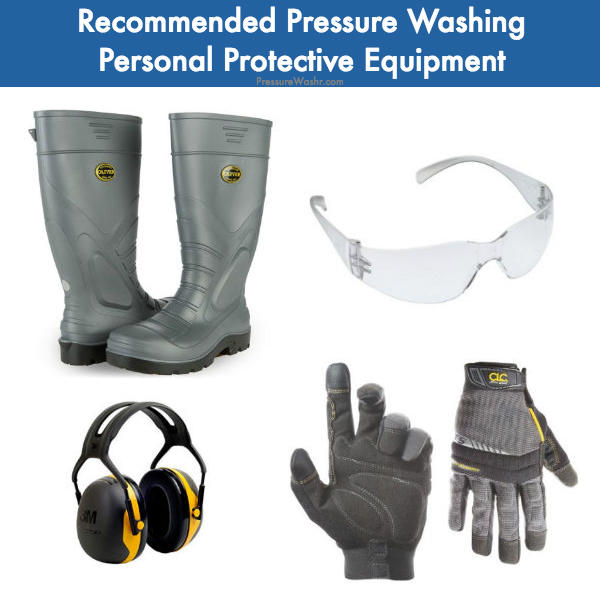
via Pressure Washr
Six: Power and pressure washing are dangerous – be safe
While it might not seem like that thin stream of water could be harmful to humans, it really is quite dangerous. It comes out of the end of that wand at up to 2,000 pounds of force. It’s enough to send chips of concrete and stone ricocheting at you or someone else with the force and deadliness of a bullet. Things to keep in mind when power/pressure washing:
- Never spray a power/pressure washer at a water or electrical outlet. Secure or cover all water and electrical outlets before spraying.
- Never spray a power/pressure washer at another person – the spray can seriously hurt or even kill them.
- Use safety glasses, goggles and better yet – a full face shield when spraying
- Close range is great for some applications, but stay at least 5-to-6 feet away from the surface you’re cleaning until you know how the spray reacts.
- Start with the lowest setting possible and test it on a hard surface before spraying windows, or soft surfaces.
- Start from the top of a vertical surface and wash your way down so your dirty water isn’t cascading over clean areas.
- Spray first with a chemical or cleaning solution and let soak for 5 to ten minutes, then immediately rinse with clean water. Don’t allow the cleaning solution to dry on the surface as it simply redeposits dirt you loosened initially. Spray it with an ordinary garden hose to keep it wet or moist while it’s soaking.
- Depending on the size of the area, what needs to be cleaned from it, and your resources, it’s often better to hire a commercial power washing company to clean your home, drive, or deck.
- If you’re renting the unit, ask the shop or clerk to demonstrate how to use the unit and not just explain its operation to you.
- Make sure you’re using the correct nozzle for the job you’re doing. A 0-degree nozzle has the hardest spray and is best used for clumps of dirt, algae, mud and stains. A 40-degree nozzle sprays wide and is best used for house siding, sidewalks, patios, decks etc.
Seven: Consider the time of year
Most power/pressure washing is done in the fall or spring. If you do get a few warm days in winter, check the weather forecast. Shooting water into cracks and crevices is fine in warm or cool weather, but if you’re expecting freezing weather within a few days to a week of pressure/washing be aware that water may freeze and expand, damaging what you’ve cleaned. Make sure that temps won’t drop below freezing before you wash.
Power/pressure washing is a great way to clean up your home, but exercise caution if you’ve never used a sprayer before, and learn all you can about how to clean your home, car, fence or driveway before you turn on your washer.
The very talented professionals at Homes.com share tips, suggestions, news and more as it pertains to the Real Estate Industry.



